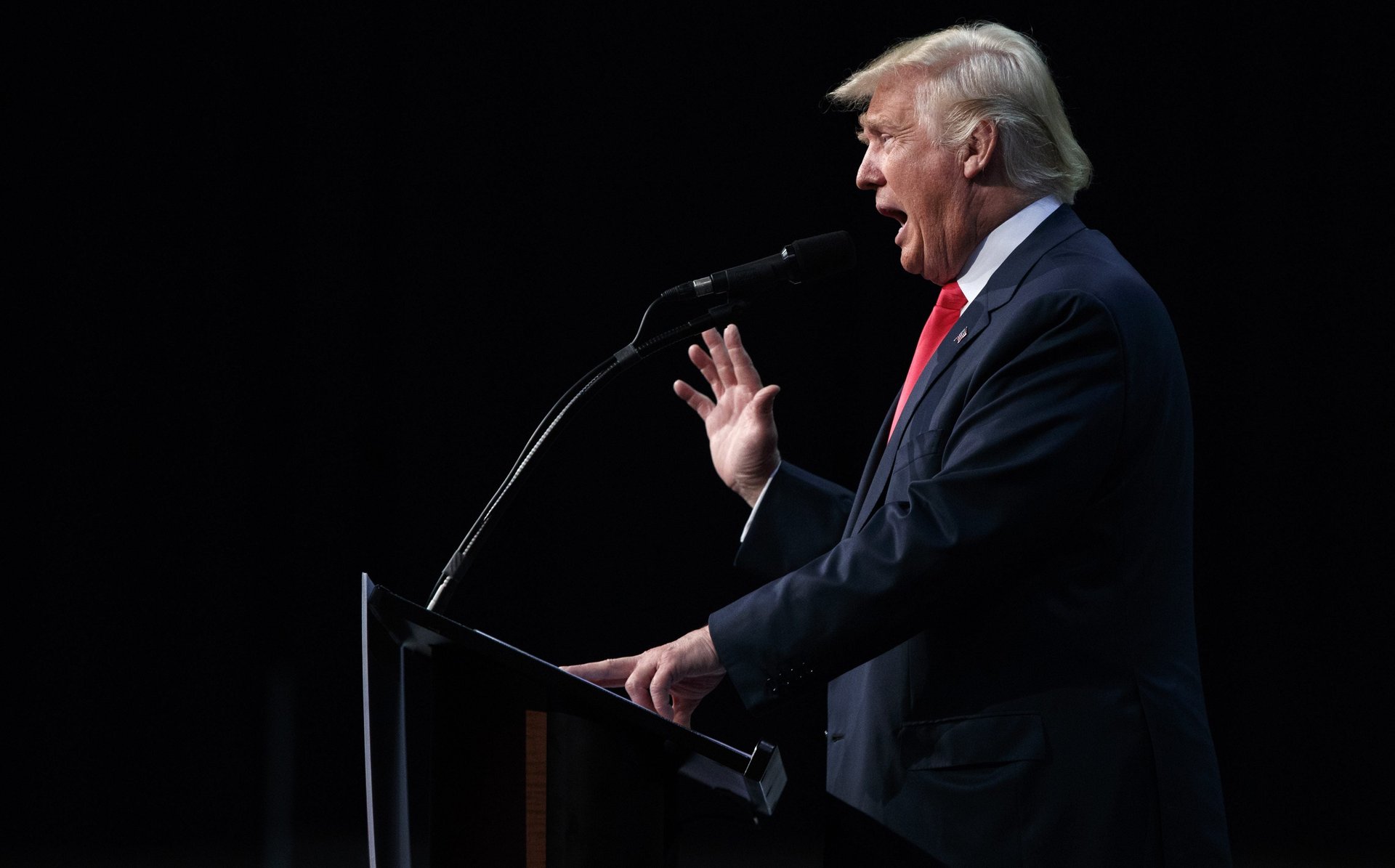Sprinkled among Trump’s outrageous comments are some ideas a Democrat could love
Donald Trump’s modus operandi is the outrageous taunt. It almost doesn’t matter the assertion—the Republican nominee’s crowds, savoring yet another hammer-blow at the rotten, losing, unsalvagably corrupt American system, respond with some barbed chants of their own.


Donald Trump’s modus operandi is the outrageous taunt. It almost doesn’t matter the assertion—the Republican nominee’s crowds, savoring yet another hammer-blow at the rotten, losing, unsalvagably corrupt American system, respond with some barbed chants of their own.
But not everything out of Trump’s mouth is an extremist insult. If you strip out the ad hominem attacks, some of his proposals are fairly sensible. They’re middle-of-the-road in the traditional sense—positions that his Democratic opponent, Hillary Clinton, herself has either espoused or philosophically could take.
It’s a mark of today’s ultra-divided politics that none of the positions seems likely to actually become law. But here are five of them.
1. Give voters a say on fracking
In 2014, the voters of Denton, Texas, irate over truck traffic and water scarcity, banned hydraulic fracturing within municipal lines; five months later, the state’s legislature banned such bans, arguing that they violate the best interests of the state as a whole. Hydraulic fracturing, or fracking, the method used to produce oil and gas from shale, is no ordinary mechanical issue—the US political parties have made it partisan.
Democrats generally oppose fracking on environmental grounds, while Republicans favor it as an issue of free enterprise. Here is where Trump has gone against the orthodoxy. On July 31, he told a Denver television station, “Well I’m in favor of fracking, but I think that voters should have a big say in it. I mean there are some areas maybe that don’t want to have fracking.” Hearing of this heresy, oil industry officials got nervous. But it’s the type of middle-ground approach that would be embraced by many Democrats.
2. Cool off with a trip to the beach
On March 20, 2003, the US went to war in Iraq, quickly ousting ruler Saddam Hussein and setting off the chain of events that, when combined with the Arab Spring, include today’s destabilization of Syria and flood of migrants into Europe. Trump has said numerous times that the US would be in a much better position if, instead of declaring war on Iraq, then-president George W. Bush and his team had just “gone to the beach” for a few days.
In his acceptance speech at the Republican National Convention, Trump said, “We must abandon the failed policy of nation building and regime change.” Such noninterventionism, and its implicit condemnation of Bush’s signature issue, finds powerful common cause with Bernie Sanders, Clinton’s main rival for her party’s nomination.
3. Double down on infrastructure
Clinton has called for the creation of a national infrastructure bank to fund $500 billion in reconstruction of roads, bridges, and other public projects. Sanders urged that the sum be $1 trillion over five years. On Aug. 2, Trump again jumped in bed with Sanders, advocating the creation of a bond fund that would spend up to $1 trillion to repair the country’s crumbling infrastructure. ”We will build the roads, highways, bridges, tunnels, airports, and the railways of tomorrow,” he said. Hmmm … where have we heard that language?
4. Break up the banks
In 1999, then-president Bill Clinton repealed the Glass-Steagall Act, the Depression-era law that barred banks from engaging in both ordinary consumer and investment banking. Critics, including Sanders and fellow Democratic senator Elizabeth Warren, blame the change in policy for the excesses behind the 2008 financial crash, arguing that big banks gorged themselves on business in which they should never have been permitted. Now they’re advocating for a return of Glass-Steagall, if a new version for this century. In July, at Trump’s insistence, the Republicans insert the reinstatement of Glass-Steagall in the party’s convention platform. Again, Trump is aligning with the left wing of the Democratic Party.
5. Appoint Ivanka as secretary of women’s issues?
If Ivanka Trump, the nominee’s eldest daughter, is a reliable messenger of her father’s intentions, then there’s perhaps another big area in which he aligns with American moderates, and that’s on women’s issues.
In her speech before the Republican convention, Ivanka Trump identified herself from the outset as neither “categorically Republican or Democrat.” She went on to promise that her father “will fight for equal pay for equal work,” along with quality, affordable childcare accessible to all. Trump himself has promised neither on the campaign trail. But, given that his daughter made the remarks as an introduction for his speech, one presumes that he at least had foreknowledge that she would make him sound—yes—decidedly middle of the road.